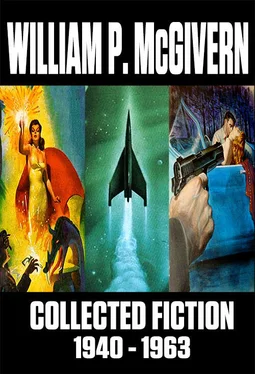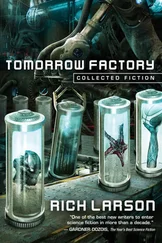Уильям Макгиверн - Collected Fiction - 1940-1963
Здесь есть возможность читать онлайн «Уильям Макгиверн - Collected Fiction - 1940-1963» весь текст электронной книги совершенно бесплатно (целиком полную версию без сокращений). В некоторых случаях можно слушать аудио, скачать через торрент в формате fb2 и присутствует краткое содержание. Год выпуска: 2014, Издательство: Jerry eBooks, Жанр: Ужасы и Мистика, Фантастика и фэнтези, Детектив, Прочие приключения, на английском языке. Описание произведения, (предисловие) а так же отзывы посетителей доступны на портале библиотеки ЛибКат.
- Название:Collected Fiction: 1940-1963
- Автор:
- Издательство:Jerry eBooks
- Жанр:
- Год:2014
- ISBN:нет данных
- Рейтинг книги:3 / 5. Голосов: 1
-
Избранное:Добавить в избранное
- Отзывы:
-
Ваша оценка:
- 60
- 1
- 2
- 3
- 4
- 5
Collected Fiction: 1940-1963: краткое содержание, описание и аннотация
Предлагаем к чтению аннотацию, описание, краткое содержание или предисловие (зависит от того, что написал сам автор книги «Collected Fiction: 1940-1963»). Если вы не нашли необходимую информацию о книге — напишите в комментариях, мы постараемся отыскать её.
Collected Fiction: 1940-1963 — читать онлайн бесплатно полную книгу (весь текст) целиком
Ниже представлен текст книги, разбитый по страницам. Система сохранения места последней прочитанной страницы, позволяет с удобством читать онлайн бесплатно книгу «Collected Fiction: 1940-1963», без необходимости каждый раз заново искать на чём Вы остановились. Поставьте закладку, и сможете в любой момент перейти на страницу, на которой закончили чтение.
Интервал:
Закладка:
“You’re smart, figure it out,” Ryan said.
“Please. Why did you do it?”
“Don’t bother me,” Ryan said.
“Tell him, please tell him,” the girl said.
It was so damn simple, Ryan thought. What were they excited about? “I had to,” he said, in a slow, patient voice. “He was going to shoot her, so I had to stop him. That’s my job.”
They both leaned closer to him as he spoke, and he knew that was a bad sign. He was barely whispering now; soon he’d begin to choke. Ryan had observed this fatal sequence so often that he had some difficulty realizing that this time he wasn’t a spectator.
“I don’t understand,” the little man said. “I don’t understand.”
Ryan tried to laugh. It struck him as funny. “Jeez, you’re real smart,” he said.
“Why did you strike me? I felt you didn’t want to.”
“I had to.”
“But why?”
They wouldn’t leave him alone. “I got to take care of the good people,” Ryan said. He knew it was about all over, but suddenly he wanted to talk. He experienced a vast sense of release now, and he knew he could make them understand. They were wrong about him, and he would set them straight. “I never wanted to hit anybody,” he said. “But I had to. I had to take care of the good people. I didn’t know any of them, but it was my job to take care of them, you see.” This wasn’t it, he realized sadly. He didn’t know the words that would explain everything simply, inevitably.
“I’m a bad guy,” he said, trying another tack. “But it was because I was fighting something bad.” That was closer to it, but still not exactly right. Suddenly he was tired of talking. “What the hell,” he said. “It don’t make no difference.”
“Is he dying?” the girl said again, in a tight, anxious voice.
“Yes. I was wrong about him, I think. When he struck me I hated him, and that destroyed my judgment. I’d never known hatred, you see, and it’s the one disease that kills all that’s worth while in us. He was a moralist of sorts. But without judgment. He chose the right thing to protect, but he protected it with primitive techniques.”
“He saved me,” Linda said. “He took those bullets that were meant for me.”
“That’s true,” the little man. “He had to, you see. You were good, and it was his job to protect you.”
“You could save him, couldn’t you? You’re smart, you know a lot of things.”
“Is he worth saving?” the little man said.
“Go to hell,” Ryan said. He wasn’t taking favors from anyone; but they didn’t hear him.
“Yes, yes, he is,” Linda said in a low, pleading voice. “I know he’s worth saving. And you’ve got to stay here now. Find those government big-shots and tell them how to make things better here, like you were telling me yesterday.”
“Yes, I think I’ll stay,” the little man said.
“And you’ll save him?”
“Yes, I’ll save him,” the little man from Esiderion said. He glanced at Linda, smiling now. “Don’t worry. I think I’ll save you all.”
I Love Lucifer
First published in the December 1953/January 1954 issue of Amazing Stories .
Her parents must have been kidding. Who ever heard of naming a sweet, beautiful little girl Lucifer? If she had been some nauseous brat right out of the Brimstone Heights section of Hell, you could understand it. But actually she was just the opposite and as smart as you could want.
Maybe that was her trouble...
“Hi,” said the little girl.
She was about four-feet tall, with silky blonde hair and big blue eyes. Her face was very pretty, grave and delicate at once, and her clothes had been chosen by someone who had known how to flatter her fragile beauty. She wore a pale blue dress, starched and immaculate, with a full skirt that flared out over a white ruffled petticoat. There was a black bow in her hair that neatly matched her tiny, black patent-leather pumps, and her short white socks were almost as white as her childishly slim legs.
“Well, well,” the old man said putting down his newspaper and looking at her with a surprised smile. He had been sitting in the sun, surrounded by space and silence, his chair tilted back against the wall of a small, stoutly-constructed house. Before him spread the fantastic beauty of a space-ship dump — dozens of acres of tall gleaming ships, moored here permanently, their slim noses pointing upward to the great reaches of space they would never know again.
“Say, where’d you come from?” he asked, shifting around in his chair to face her. His name was John Logan and he had been the caretaker of this space-ship cemetery for twenty-six years; and this was the first time he had entertained such an improbable visitor.
“I came from the city,” the little girl said in a sweet low voice.
The city was five miles away, old John knew. “I’ll be darned,” he said, chuckling. “Did you walk?”
She looked away from him and sighed. “Well, yes,” she said patiently, in the voice children use to relegate adult teasing to its proper low status.
“Your Mommy’s going to be worried about you,” old John said, a trifle concerned.
“I suppose,” she said, facing it practically. “But I wanted to come so I came. I’ll be back in time for dinner if I don’t stay too long.”
“Well, you’re mighty welcome,” old John said. “It’s just that I don’t want your folks worrying.”
“Oh, well,” she said matter-of-factly, dismissing the idea. “Can I play here?”
“Sure,” old John said. “Johnny!” he called. “Come out here. We got a pretty little visitor.”
The door of the house opened and a sturdy, apple-cheeked boy appeared. He was about five, with taffy-colored hair which needed cutting, and a span of freckles running from one cheekbone across a snub nose. His eyes were full of shy wonder as he stared at the small, fragile girl.
“This here’s Johnny,” old John said to the girl. “He don’t see many people so he’s apt to be bashful with you for a while. What’s your name?”
“Lucifer,” she said.
Old John grinned. “That ain’t no name for a pretty little girl.”
“Well, it’s my name anyway.”
“I ain’t quarelling with you about it,” old John said. “But what’s your other name. I mean the one you’re Mommy and Daddy call you by.”
“Lucifer,” she told him patiently.
His shrewd gambit having failed, old John gave up. “All right, Lucifer it is,” he said.
The little girl took a red rubber ball from her pocket and began bouncing it on the ground. “ Come on, let’s play,” she said to Johnny.
But Johnny pressed closer to old John’s leg and stared at her in silence. His fat little fingers twitched with excitement as he watched her bounce the ball up and down, but his expression was confused and shy.
“I told you he don’t see many people,” old John said apologetically.
This was true, of course, and it was a great source of worry to the old man. He was Johnny’s grandfather; both the boys parents were dead, and it was his task to raise him. And he wasn’t doing a very good job, he knew. He dressed him and fed him and saw to it that he got his rest, but his work kept him out here at the cemetery seven days a week and he couldn’t provide much companionship for the little boy. Not that he didn’t try; but no adult can play satisfactorily with children. The child soon realizes that an adult on his knees playing with blocks and toy soldiers is no substitute for the real thing, which is a real child.
“He’ll get used to you after a while,” said old John hopefully.
“Sure he will,” the little girl said, and went on bouncing her red rubber ball. “It’s just because he’s so young.”
Читать дальшеИнтервал:
Закладка:
Похожие книги на «Collected Fiction: 1940-1963»
Представляем Вашему вниманию похожие книги на «Collected Fiction: 1940-1963» списком для выбора. Мы отобрали схожую по названию и смыслу литературу в надежде предоставить читателям больше вариантов отыскать новые, интересные, ещё непрочитанные произведения.
Обсуждение, отзывы о книге «Collected Fiction: 1940-1963» и просто собственные мнения читателей. Оставьте ваши комментарии, напишите, что Вы думаете о произведении, его смысле или главных героях. Укажите что конкретно понравилось, а что нет, и почему Вы так считаете.

![Уильям Макгиверн - Завтра опять неизвестность [английский и русский параллельные тексты]](/books/35168/uilyam-makgivern-zavtra-opyat-neizvestnost-angli-thumb.webp)









